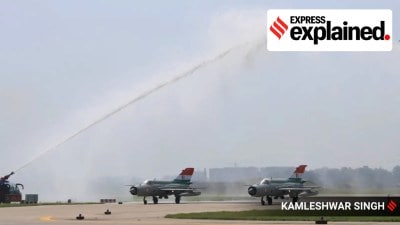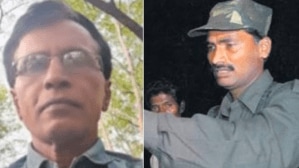FM promises higher spending, stable Re
NEW DELHI, March 20: Finance minister Yashwant Sinha today indicated that his first priority would be to revive the economy by spurring spen...

NEW DELHI, March 20: Finance minister Yashwant Sinha today indicated that his first priority would be to revive the economy by spurring spending both in the public and private sectors, stabilising the rupee and channelising foreign investment in critical areas.
Addressing a press conference soon after taking over the hot seat in North Block, Sinha said MNCs had nothing to fear from the BJP-led coalition government. He, however, gave ample hints that domestic liberalisation would have to get priority. He said that the BJP government would resequence the economic reforms process initiated June 1991.
According to him, the steps initiated in 1991 were in the right direction. But the "sequencing was not correct and certain essential things were overlooked…As a result the reforms failed to deliver in a manner in which they were expected to have delivered." His effort, Sinha stressed, would be to correct those anomalies and try to resequence the whole process.
The new finance minister also made it clear thathe would not allow a free run on Indian rupee as was witnessed in the case of the south-east Asian currencies.
On the domestic front, the new finance minister told reporters that all was not well with the Indian economy. The need of the hour was to spur spending, both in the public and private sectors. The budget for 1998-99, he added, would be prepared at the earliest for the benefit of industry and other interest groups.
According to Sinha, he would endeavour to restore the budgetary balance as quickly as possible and reverse the shortfall in revenue receipts. He said the imbalance in revenue and capital expenditure should be replaced with an equitable balance by stepping up expenditure in the core sector.
Sinha was earlier received by finance secretary Montek Singh Ahluwalia, revenue secretary N K Singh, expenditure secretary C Ramachandran and additional secretary C M Vasudev in the finance ministry. The minister, who returned to the one of the most powerful jobs in government after a gap of sevenyears, later held a detailed discussion on the state of economy with finance ministry bureaucrats. RBI governor Bimal Jalan also called on the new minister to appraise him about the monetary policy and other related issues.
Elaborating on the scope of foreign investment, Sinha said, "We will clearly define the consumer goods sectors, priority and non-priority areas." He said, "Ours will be a transparent regime and there will be no scope for confusion on that front." He added that the government had stated the areas in which foreign investment was welcome and would "see to it that procedures are streamlined to facilitate larger investment in those areas."
On the question of entry of foreign investment in the insurance sector, Sinha’s only comment was that the position had been clarified in the BJP manifesto. The manifesto, it may be recalled, promised to open insurance sector to Indian companies only. The National Agenda, however, has been silent on the issue.
As far as the value of the rupee wasconcerned, Sinha said the endeavour would be "to have a stable currency and not to permit a run on it as was witnessed in case of south-east Asian nations". The minister added that in this regard he would hold detailed discussions with Reserve Bank officials.Asked whether a high rupee would not adversely affect exports, the minister replied, "The value of the currency is just one input in exports and we will certainly look into it." In the same breath he added, "We do not support the thesis of a devaluing rupee." Exports, he said, have to be increased and would receive priority. Sinha said, "I shall discuss it with the new commerce minister and work out a package to step up foreign trade."
On the state of the economy, Sinha said, "There is a marked slowdown in various areas as a result of which the growth rate has declined." He added that there was an urgent need to increase spending, with special emphasis on the infrastructure sector. This, he added, was necessary to provide essential dynamism to theIndian economy and arrest the slowdown.





- 01
- 02
- 03
- 04
- 05


























